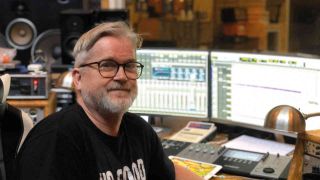Few people have been as influential on Metallica’s career as Flemming Rasmussen. The Danish studio engineer and producer’s work on 1984’s Ride The Lightning, 1986’s Master Of Puppets and 1988’s …And Justice For All helped turn these Bay Area street rats into one of the fastest-rising metal bands on the planet. Almost 40 years after he first met them, Flemming looks back on his time in Metallica’s orbit.

Can you recall the exact moment you first heard the word ‘Metallica’?
“Yes, it was when Lars called me and asked if I wanted to record Ride The Lightning. I had never heard of them, and I didn’t know Kill ’Em All existed. The first time I listened to it, they were sitting with me in my studio, Sweet Silence, with James telling me this was the kind of guitar sound he liked and wanted.”
When the four of them turned up on your doorstep in Copenhagen, what were your first impressions?
“I really loved their energy and passion and ambition. They had a totally different attitude to the Danish bands that I had worked with, and were really enthusiastic about picking my brain and learning new things. We sparked up a great friendship immediately.”
There’s a huge leap between Kill ’Em All and Ride The Lightning in terms of songwriting, dynamics, etc. Was it a challenging album to record?
“Yes, because their technical abilities then were not as developed as their ambitions! So when we listened back to what we had done, they were blown away, and were so proud. I had never heard that kind of power come through the studio speakers. While they were in the studio, they were visited by the guys from Bronze Records, who wanted to sign them for Europe, and when [label owner] Gerry Bron listened to the finished album he said they’d want to re-record everything in London. When they left, James looked at me and said, ‘What an idiot!’ as we knew that they hadn’t a clue if they couldn’t hear it was an amazing album. Bronze blew their chance to sign them right there.”
When they returned to Sweet Silence Studios to record Master Of Puppets, did they seem like the same four guys to you?
“They had matured quite a bit, and their circumstances were improved – this time they had hotel rooms, rather than sleeping on a friend’s floor – but they were just as likeable. Every day they would have dinner with my wife and myself at our house before we started recording at 7pm, and they were always fun to have around.”

For you, was that album another great leap forward for the band?
“Oh, definitely. There was so much more they could do now because their craftsmanship had improved – everything was a notch up. We had more time to finesse subtle things, little details you can hear with headphones. Master Of Puppets is superb, maybe their masterpiece. I’ve turned down so many bands over the years who thought they’d automatically get their own Master… just by working with me: not every band can be Metallica!”
And then you even turned down Metallica, when initially asked to produce …And Justice For All.
“Ha! Yes, but it was a timing thing. Lars called me in November ’87, and said, ‘We’ve booked a studio from January 1, we have it for four months, we’re doing a new album and we want you to produce it.’ I said, ‘Lars, I can’t, I’m busy until April’, and he was like [horrified yelp], ‘No! You have to come! We’ve booked the studio! Move everything else!’ I said, ‘I can’t, Lars. No.’ So they started with [Appetite For Destruction producer] Mike Clink instead. And then begged me to come over when it was obvious that wasn’t working! Ha ha!”
Do you look back upon your time working with Metallica with a sense of pride?
“Oh yeah, I’m totally stoked. I actually wrote a book recently about my career [Rock & Stjernestøv] and revisiting those albums and remembering the great experiences we had making them was a trip. Whatever happens, no one can take those memories from me.”
Published in Metal Hammer #350

